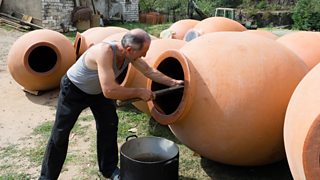Seven things you may not know about natural wine
Across Europe, the natural wine movement is growing momentum as vintners turn their backs on technology in favour of age-old winemaking processes.
As the Food Programme meets Georgia’s natural wine makers, we explore what it takes to make a bona fide natural wine.

1. Natural winemakers aim to get as close as possible to producing pure fermented grape juice
If you thought all wines were simply fermented grape juice in a bottle, think again.
EU regulations allow around 200 different substances to be added to wine, and bizarrely, none of them have to be listed on the bottle except for any allergens.
Modern winemaking is a complex industrial process designed to deliver consistent flavours and quantities. To do this, it often relies on chemical additives and processes – from fertilisers and pesticides to enzymes, sugars and yeasts.
Natural winemakers, on the other hand, use as few additives and as little intervention as possible. There’s no officially agreed definition of a ‘natural wine’, but these vintners generally avoid chemical fertilisers and pesticides, harvest the grapes by hand and turn them into wine in a low tech way. This means cutting out the preservatives and processes that other winemakers use to stabilise the wine or iron out issues with acidity and alcohol levels.
2. It uses little or no sulphur – which can be risky
Sulphur may not sound too tasty, but in winemaking it helps guarantee a good flavour. Created naturally as part of the fermentation process, sulphur kills bacteria, prevents oxidisation and helps to preserve the wine.
Most winemakers put in a bit of extra sulphur to ensure they get consistently good results, but natural wine is made with minimal or no added sulphur. This means the flavour and quality can vary from bottle to bottle. Natural wine lovers see this variation as part of its charm. But it can be risky – if things go wrong, low sulphur wines can come out tasting like vinegar, nail varnish or farmyards.

3. Natural wine is not the same as organic wine
To be certified as ‘organic’ wines must use grapes grown without chemical fertilisers, pesticides, herbicides or fungicides. So all natural wines are organic by default (although they may not be officially certified as such, since this can cost too much for small businesses).
What sets natural and organic wines apart from each other is the way the grapes are processed. The standards that define organic wines actually allow for a whole range of additives and industrial processes to be used after the grapes have been harvested. By contrast, natural wines involve little or no intervention.
4. … or biodynamic wine
Biodynamic winemakers don’t just apply organic principles, they use ancient farming techniques designed to cultivate the vines as part of a wider ecosystem. These include applying herbal and mineral ‘preparations’, and using the lunar calendar to decide when to plant, tend to and harvest their grapes.
5. Most wines aren’t vegetarian but natural wines are
Isinglass may sound like a character from The Lord of the Rings, but it’s actually an animal ingredient that’s widely used in brewing and winemaking. Derived from the dried swim bladders of fish, isinglass helps ensure a clearer, brighter drink.
If that thought turns your stomach, you should probably know that gelatin, albumin, and casein (from animal carcasses, eggs and milk) are also commonly used in wine processing.
Natural wines should be a safe bet for vegetarians and vegans though, since they avoid any additives or chemical interventions. But it's best to double check before you pop open a bottle, as there's no official certification process for natural wine.
How to become a wine expert in four minutes

If you can't afford the subscription to the expensive monthly wine mag, tell a good vintage from a bad, or fail to detect the soupçon of boysenberry with a hint of pretentiousness from your bottle of plonk, fear not!
6. Natural wines divide opinion
Some critics complain that these earthier, gamier flavours aren’t something most people would actually want to drink. Food critic Jay Rayner has been quoted as saying, “I’ve had dozens of natural wines foisted upon me and they’ve all tasted awful, brutal, unstructured, with the foul back taste of farmyard.”
Advocates for natural wine argue that the lack of intervention results in a wilder, more exciting drink with a strong sense of the place where it was grown. Master of wine Isabel Legeron says, “With natural wines, they are more upfront and expressive, in a really positive way”.

7. You’ll need to seek them out and they’re not cheap
You won’t find a bargain bottle of natural wine in the supermarket.
If you’re keen to give it a try, have a look online or in your local wine shop, and expect to pay anything from £10 to £40.
-
![]()
Zero Compromise: A (Georgian) Natural Wine Story
The Food Programme travels into the Caucasus in search of "zero compromise" natural wine makers.
-
![]()
The Crafty Beer Quiz
Craft beer names can get faintly ridiculous. Can you tell which of these are real?
-
![]()
11 things you didn't know about aperitifs
Here are some fascinating facts you might not know.
-
![]()
Escape the daily grind with our coffee quiz
Do you think you're a real coffee connoisseur? Take the plunge.




